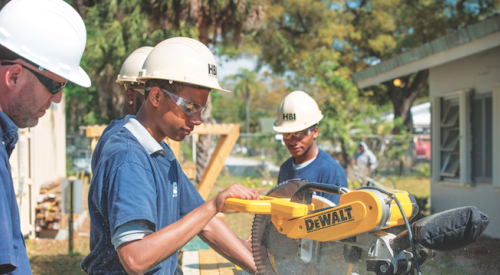Some things you just can’t do by yourself. Defeating a no-growth referendum or convincing parents and teachers that carpentry is a good curriculum choice in the local high school are certainly two items that fall into that group.
Home builders associations at the local, state and national levels are vital instruments of change that are helping this industry overcome problems such as labor shortages, anti-growth political movements, excessive environmental regulations and a host of others beyond the realm of any individual home builder.
Still, when we set up the premise for this column, a list of dos and don’ts for a new builder trying to quickly become a market leader, we found experienced builders split over whether seeking leadership positions in the local HBA is a good idea for a startup builder.
David Weekley of Houston Giant David Weekley Homes said it would just take time away from the business, where the founder should spend 14 hours a day. But Lonnie Fedrick of Newmark Homes, another Houston Giant, called it a critical activity to make contacts and develop enough recognition to facilitate land buys.
Not content to flip a coin on this issue, I have continued to ask the question, most recently at the Southeast Building Conference in Orlando, Fla. To refocus interviewees on this inherent conflict between a startup and industry-related association activities, I asked two questions: "When did you found your business?" and "When did you join the HBA?"
The responses surprised me (but probably shouldn’t have). Every builder I spoke to said he joined the local HBA before launching his business -- reflecting, perhaps, the important networking function Fedrick pointed out. But most of the builders went on to say that they began their leadership careers in the HBA a year or two after launch.
Tulsa, Okla., builder Ken Klein, who heads the NAHB’s nationwide Smart Growth initiative, has an interesting perspective on why even new builders should be involved in HBA activities as quickly as possible:
"Anybody entering the home building business today should understand that this is now a very complex industry," says Klein. "But in most cases, it’s only after you’ve been in it a while that you realize all the risks you take every day just by going to work. Membership in an HBA gives you a much better grasp of those risks, all the interests that can take ground right out from under you.
"In the local HBA, you have access to people who have been through the wars. And most of them are willing to act as mentors, to keep you away from the pitfalls and allow you to grow your business at a faster rate. If not for the things I learned in NAHB, I probably would not have survived the oil bust in Oklahoma in the late 1980s."
Gainesville, Fla., builder Barry Rutenberg, a pillar in local, state and national associations, has doubled the size of his company this past year even while serving as president of the Florida HBA. "In my local association, we’ve had a succession of officers who experienced growth in their businesses while serving in office," he says.
Florida HBA executive vice president Paul Thompson has an interesting observation on Rutenberg and others in leadership roles in both state and local HBAs:
"One of the first lessons a builder has to learn in order to grow is how to delegate -- how to build an empowered management team. When a builder goes into HBA leadership positions, he or she has to do that even if the natural inclination is to hold on to power and authority.
"Leadership of an HBA teaches skills like empowerment and cooperative learning. Those skills are readily transferable to the business at home," says Thompson.
Does it really matter who serves in HBA leadership positions as long as someone does? Well, if those leaders are not articulate and persuasive, we might all be in a lot of trouble. It’s amazing how many people, in and out of government, have no idea how much the fabric of our whole society depends on home building.
The bottom line of all of this is that the need for home building’s best and brightest stars to get involved in HBA leadership has never been greater. Check out our Letters to the Editor page, and you’ll find an example of the challenges that are out there in Denver land planner David Clinger’s frightening account of the impending collision of market forces and politics on Colorado’s Front Range.
What good does it do to stay in your office, nose to the grindstone, while labor costs and lot prices spiral out of control because of issues that can be addressed only in the halls of government?
Now is the time for all good people to come to the aid of their country ...












